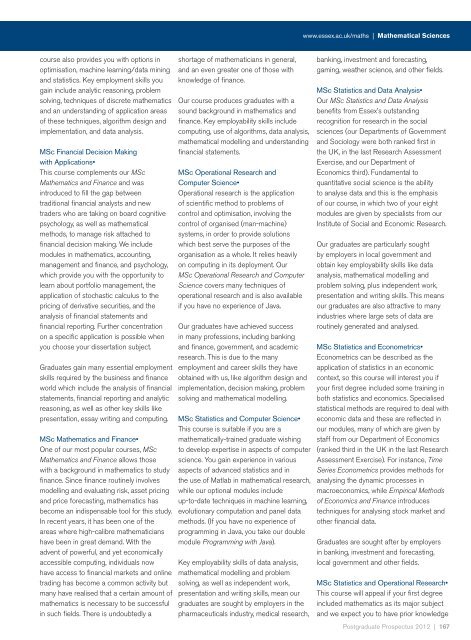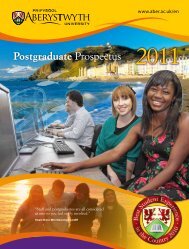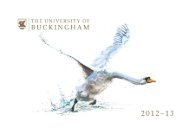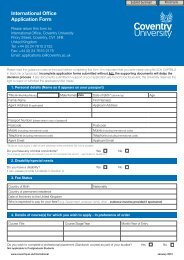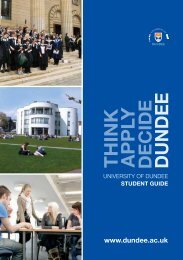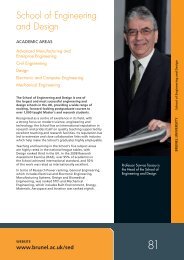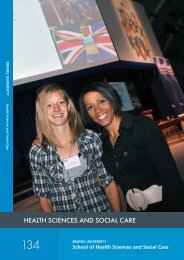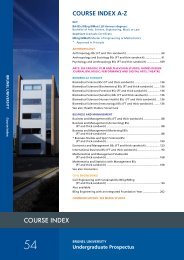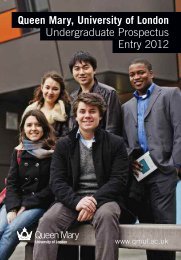Postgraduate Prospectus
Postgraduate Prospectus
Postgraduate Prospectus
Create successful ePaper yourself
Turn your PDF publications into a flip-book with our unique Google optimized e-Paper software.
www.essex.ac.uk/maths | Mathematical Sciences<br />
course also provides you with options in<br />
optimisation, machine learning/data mining<br />
and statistics. Key employment skills you<br />
gain include analytic reasoning, problem<br />
solving, techniques of discrete mathematics<br />
and an understanding of application areas<br />
of these techniques, algorithm design and<br />
implementation, and data analysis.<br />
MSc Financial Decision Making<br />
with Applications•<br />
This course complements our MSc<br />
Mathematics and Finance and was<br />
introduced to fill the gap between<br />
traditional financial analysts and new<br />
traders who are taking on board cognitive<br />
psychology, as well as mathematical<br />
methods, to manage risk attached to<br />
financial decision making. We include<br />
modules in mathematics, accounting,<br />
management and finance, and psychology,<br />
which provide you with the opportunity to<br />
learn about portfolio management, the<br />
application of stochastic calculus to the<br />
pricing of derivative securities, and the<br />
analysis of financial statements and<br />
financial reporting. Further concentration<br />
on a specific application is possible when<br />
you choose your dissertation subject.<br />
Graduates gain many essential employment<br />
skills required by the business and finance<br />
world which include the analysis of financial<br />
statements, financial reporting and analytic<br />
reasoning, as well as other key skills like<br />
presentation, essay writing and computing.<br />
MSc Mathematics and Finance•<br />
One of our most popular courses, MSc<br />
Mathematics and Finance allows those<br />
with a background in mathematics to study<br />
finance. Since finance routinely involves<br />
modelling and evaluating risk, asset pricing<br />
and price forecasting, mathematics has<br />
become an indispensable tool for this study.<br />
In recent years, it has been one of the<br />
areas where high-calibre mathematicians<br />
have been in great demand. With the<br />
advent of powerful, and yet economically<br />
accessible computing, individuals now<br />
have access to financial markets and online<br />
trading has become a common activity but<br />
many have realised that a certain amount of<br />
mathematics is necessary to be successful<br />
in such fields. There is undoubtedly a<br />
shortage of mathematicians in general,<br />
and an even greater one of those with<br />
knowledge of finance.<br />
Our course produces graduates with a<br />
sound background in mathematics and<br />
finance. Key employability skills include<br />
computing, use of algorithms, data analysis,<br />
mathematical modelling and understanding<br />
financial statements.<br />
MSc Operational Research and<br />
Computer Science•<br />
Operational research is the application<br />
of scientific method to problems of<br />
control and optimisation, involving the<br />
control of organised (man-machine)<br />
systems, in order to provide solutions<br />
which best serve the purposes of the<br />
organisation as a whole. It relies heavily<br />
on computing in its deployment. Our<br />
MSc Operational Research and Computer<br />
Science covers many techniques of<br />
operational research and is also available<br />
if you have no experience of Java.<br />
Our graduates have achieved success<br />
in many professions, including banking<br />
and finance, government, and academic<br />
research. This is due to the many<br />
employment and career skills they have<br />
obtained with us, like algorithm design and<br />
implementation, decision making, problem<br />
solving and mathematical modelling.<br />
MSc Statistics and Computer Science•<br />
This course is suitable if you are a<br />
mathematically-trained graduate wishing<br />
to develop expertise in aspects of computer<br />
science. You gain experience in various<br />
aspects of advanced statistics and in<br />
the use of Matlab in mathematical research,<br />
while our optional modules include<br />
up-to-date techniques in machine learning,<br />
evolutionary computation and panel data<br />
methods. (If you have no experience of<br />
programming in Java, you take our double<br />
module Programming with Java).<br />
Key employability skills of data analysis,<br />
mathematical modelling and problem<br />
solving, as well as independent work,<br />
presentation and writing skills, mean our<br />
graduates are sought by employers in the<br />
pharmaceuticals industry, medical research,<br />
banking, investment and forecasting,<br />
gaming, weather science, and other fields.<br />
MSc Statistics and Data Analysis•<br />
Our MSc Statistics and Data Analysis<br />
benefits from Essex’s outstanding<br />
recognition for research in the social<br />
sciences (our Departments of Government<br />
and Sociology were both ranked first in<br />
the UK, in the last Research Assessment<br />
Exercise, and our Department of<br />
Economics third). Fundamental to<br />
quantitative social science is the ability<br />
to analyse data and this is the emphasis<br />
of our course, in which two of your eight<br />
modules are given by specialists from our<br />
Institute of Social and Economic Research.<br />
Our graduates are particularly sought<br />
by employers in local government and<br />
obtain key employability skills like data<br />
analysis, mathematical modelling and<br />
problem solving, plus independent work,<br />
presentation and writing skills. This means<br />
our graduates are also attractive to many<br />
industries where large sets of data are<br />
routinely generated and analysed.<br />
MSc Statistics and Econometrics•<br />
Econometrics can be described as the<br />
application of statistics in an economic<br />
context, so this course will interest you if<br />
your first degree included some training in<br />
both statistics and economics. Specialised<br />
statistical methods are required to deal with<br />
economic data and these are reflected in<br />
our modules, many of which are given by<br />
staff from our Department of Economics<br />
(ranked third in the UK in the last Research<br />
Assessment Exercise). For instance, Time<br />
Series Econometrics provides methods for<br />
analysing the dynamic processes in<br />
macroeconomics, while Empirical Methods<br />
of Economics and Finance introduces<br />
techniques for analysing stock market and<br />
other financial data.<br />
Graduates are sought after by employers<br />
in banking, investment and forecasting,<br />
local government and other fields.<br />
MSc Statistics and Operational Research•<br />
This course will appeal if your first degree<br />
included mathematics as its major subject<br />
and we expect you to have prior knowledge<br />
<strong>Postgraduate</strong> <strong>Prospectus</strong> 2012 | 167


